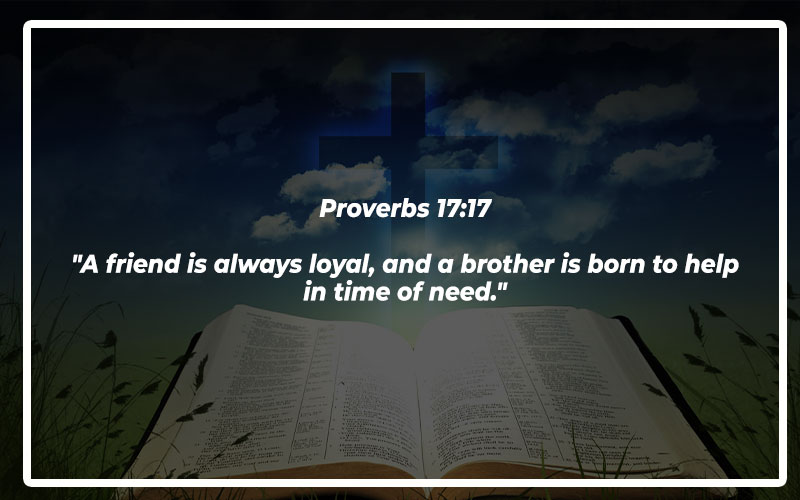Fake friends can be a challenging part of life, and the Bible provides wisdom and guidance on how to deal with such individuals. Below are powerful themes with selected Bible verses to help you navigate relationships with authenticity and grace. Do read on!
Also Read: Bible Verses About Betrayal
Betrayal by Fake Friends
Betrayal by fake friends is a painful experience that many people face. The Bible speaks to this reality and offers comfort and advice on how to handle such situations.
Psalm 55:12-14
“It is not an enemy who taunts me—I could bear that. It is not my foes who so arrogantly insult me—I could have hidden from them. Instead, it is you—my equal, my companion and close friend. What good fellowship we once enjoyed as we walked together to the house of God.”

These verses highlight the deep pain caused by betrayal from someone close. It’s a reminder that even those who seem trustworthy can disappoint us. The Psalmist expresses a profound sense of hurt, which underscores the emotional impact of betrayal by a friend.
Proverbs 25:19
“Putting confidence in an unreliable person in times of trouble is like chewing with a broken tooth or walking on a lame foot.”
This verse uses vivid imagery to illustrate the dangers of relying on unreliable people. Just as a broken tooth or lame foot causes discomfort and pain, trusting a fake friend can lead to significant emotional distress and disappointment.
Matthew 26:48-50
“The traitor, Judas, had given them a prearranged signal: ‘You will know which one to arrest when I greet him with a kiss.’ So Judas came straight to Jesus. ‘Greetings, Rabbi!’ he exclaimed and gave him the kiss.”
This passage recounts the ultimate betrayal of Jesus by Judas. The act of betrayal through a kiss, a sign of affection, shows how deceitful a fake friend can be. It reminds us to be cautious and discerning in our relationships.
Proverbs 27:6
“Wounds from a sincere friend are better than many kisses from an enemy.”
This verse teaches that honest criticism from a true friend is valuable, whereas false affection from an enemy (or fake friend) is worthless. It encourages us to appreciate genuine relationships that might sometimes challenge us but are rooted in truth.
John 13:21
“Now Jesus was deeply troubled, and he exclaimed, ‘I tell you the truth, one of you will betray me!'”
Jesus’ acknowledgment of his betrayal reveals the heartache that comes with being deceived by someone close. It serves as a reminder that betrayal is a common human experience, even for Jesus, and it calls us to seek solace in God’s understanding and presence.
Recognizing Fake Friends
Recognizing fake friends can be challenging, but the Bible offers wisdom to help identify those who may not have our best interests at heart.
Proverbs 20:6
“Many will say they are loyal friends, but who can find one who is truly reliable?”
This verse points out the difficulty in finding genuinely loyal friends. It encourages us to be discerning and not take people at their word but rather judge them by their actions and consistency.
Matthew 7:15
“Beware of false prophets who come disguised as harmless sheep but are really vicious wolves.”
Jesus warns about those who appear innocent but have malicious intentions. This principle can be applied to friendships, reminding us to be cautious and not be deceived by appearances alone.
Psalm 41:9
“Even my best friend, the one I trusted completely, the one who shared my food, has turned against me.”
This verse reflects the pain of betrayal by a close friend. It serves as a reminder to be vigilant and understand that even those we trust most can sometimes let us down.
2 Timothy 3:5
“They will act religious, but they will reject the power that could make them godly. Stay away from people like that!”
Paul advises Timothy to be wary of people who have a form of godliness but lack its power. This instruction is relevant for friendships, urging us to be mindful of those who might appear good but do not embody true godly values.
Proverbs 18:24
“There are ‘friends’ who destroy each other, but a real friend sticks closer than a brother.”
This verse contrasts fake friends, who can bring harm, with true friends who remain loyal and supportive. It encourages us to seek and cherish relationships that are genuinely nurturing and dependable.
The Consequences of Fake Friendships
Fake friendships can have serious consequences, affecting our emotional and spiritual well-being. The Bible addresses the impact of such relationships.
Proverbs 13:20
“Walk with the wise and become wise; associate with fools and get in trouble.”
This verse highlights the influence of our associations. Being around fake friends, who are often foolish or deceitful, can lead to negative outcomes and trouble. It urges us to choose our companions wisely.
1 Corinthians 15:33
“Don’t be fooled by those who say such things, for ‘bad company corrupts good character.'”
Paul warns about the corrupting influence of bad company. Fake friends can erode our moral character and lead us away from righteous living. This verse calls for vigilance in our choice of friends.
Proverbs 16:28
“A troublemaker plants seeds of strife; gossip separates the best of friends.”
This verse points out how fake friends, often troublemakers and gossipers, can cause discord and separation among close friends. It underscores the destructive potential of insincere relationships.
James 4:4
“You adulterers! Don’t you realize that friendship with the world makes you an enemy of God? I say it again: If you want to be a friend of the world, you make yourself an enemy of God.”
James emphasizes the spiritual danger of aligning with worldly, ungodly influences. Fake friends who embody such values can lead us away from God. This verse calls us to prioritize our relationship with God over any misleading friendships.
Proverbs 22:24-25
“Don’t befriend angry people or associate with hot-tempered people, or you will learn to be like them and endanger your soul.”
This advice warns against associating with angry or hot-tempered individuals, who often exhibit traits of fake friends. Their negative behavior can rub off on us, jeopardizing our peace and spiritual well-being.
Also Read: Bible Verses About Karma
Trusting God Amidst Betrayal
When betrayed by fake friends, trusting in God can provide solace and strength. The Bible encourages us to lean on Him during these times.
Psalm 55:22
“Give your burdens to the Lord, and he will take care of you. He will not permit the godly to slip and fall.”
This verse offers comfort, reminding us to cast our burdens, including the pain of betrayal, onto the Lord. Trusting in God ensures that He will support and sustain us through challenging times.
Psalm 56:3-4
“But when I am afraid, I will put my trust in you. I praise God for what he has promised. I trust in God, so why should I be afraid? What can mere mortals do to me?”
The Psalmist expresses confidence in God’s protection and promises. Even amidst betrayal and fear, trusting in God brings peace and reassurance that no human betrayal can ultimately harm us.
Isaiah 41:10
“Don’t be afraid, for I am with you. Don’t be discouraged, for I am your God. I will strengthen you and help you. I will hold you up with my victorious right hand.”
This verse reassures us of God’s presence and support. In times of betrayal, God promises strength and help, lifting us up and sustaining us with His power.
Proverbs 3:5-6
“Trust in the Lord with all your heart; do not depend on your own understanding. Seek his will in all you do, and he will show you which path to take.”
Trusting in the Lord wholeheartedly, especially when dealing with fake friends, ensures that He will guide us and provide wisdom beyond our understanding. This verse encourages us to seek God’s direction in all things.
Romans 8:28
“And we know that God causes everything to work together for the good of those who love God and are called according to his purpose for them.”
This verse assures us that God can bring good out of any situation, including the pain caused by fake friends. It encourages us to trust that God’s purpose for us will prevail despite the actions of others.
Forgiveness and Moving On
The Bible teaches the importance of forgiveness and moving on from the hurt caused by fake friends. It guides us to let go and trust in God’s justice.
Matthew 6:14-15
“If you forgive those who sin against you, your heavenly Father will forgive you. But if you refuse to forgive others, your Father will not forgive your sins.”
Jesus emphasizes the necessity of forgiveness. Letting go of the hurt caused by fake friends not only frees us but also aligns us with God’s will, ensuring our own forgiveness.
Ephesians 4:31-32
“Get rid of all bitterness, rage, anger, harsh words, and slander, as well as all types of evil behavior. Instead, be kind to each other, tenderhearted, forgiving one another, just as God through Christ has forgiven you.”
Paul advises us to let go of negative emotions and instead embrace kindness and forgiveness. This guidance helps us heal from the wounds inflicted by fake friends and fosters a spirit of compassion.
Colossians 3:13
“Make allowance for each other’s faults, and forgive anyone who offends you. Remember, the Lord forgave you, so you must forgive others.”
This verse calls us to extend forgiveness, just as we have been forgiven by the Lord. It encourages us to show grace to those who have wronged us, reflecting God’s love and mercy.
Luke 6:27-28
“But to you who are willing to listen, I say, love your enemies! Do good to those who hate you. Bless those who curse you. Pray for those who hurt you.”
Jesus teaches radical love and forgiveness, even towards our enemies. This instruction challenges us to rise above the pain caused by fake friends and respond with love and prayer for them.
Romans 12:19
“Dear friends, never take revenge. Leave that to the righteous anger of God. For the Scriptures say, ‘I will take revenge; I will pay them back,’ says the Lord.”
This verse reassures us that vengeance belongs to God. Instead of seeking revenge on fake friends, we are called to trust in God’s justice, knowing that He will handle matters righteously.
Choosing True Friends
The Bible provides guidance on choosing true friends who will support and uplift us. It emphasizes the value of genuine, Godly relationships.
Proverbs 17:17
“A friend is always loyal, and a brother is born to help in time of need.”

This verse highlights the loyalty and support of a true friend, contrasting the reliability of genuine relationships with the inconsistency of fake friends.
Ecclesiastes 4:9-10
“Two people are better off than one, for they can help each other succeed. If one person falls, the other can reach out and help. But someone who falls alone is in real trouble.”
This passage emphasizes the strength found in true friendships. Genuine friends support each other and provide help in times of need, reflecting the mutual benefit of authentic relationships.
Proverbs 27:9
“The heartfelt counsel of a friend is as sweet as perfume and incense.”
This verse underscores the value of sincere advice from a true friend. Such counsel is precious and uplifting, contrasting with the deceit and harm of fake friends.
John 15:13
“There is no greater love than to lay down one’s life for one’s friends.”
Jesus speaks of the ultimate act of love and friendship, laying down one’s life for a friend. This profound statement highlights the depth of commitment and sacrifice in genuine relationships.
1 Thessalonians 5:11
“So encourage each other and build each other up, just as you are already doing.”
Paul encourages mutual support and edification among friends. True friends uplift and encourage one another, fostering a positive and nurturing environment.
Seeking God’s Wisdom in Relationships
Seeking God’s wisdom is crucial in forming and maintaining healthy relationships. The Bible guides us to pray for discernment and rely on God’s direction.
James 1:5
“If you need wisdom, ask our generous God, and he will give it to you. He will not rebuke you for asking.”
This verse reassures us that God generously gives wisdom to those who ask. In navigating relationships, we are encouraged to seek His guidance for discernment and understanding.
Proverbs 3:5-6
“Trust in the Lord with all your heart; do not depend on your own understanding. Seek his will in all you do, and he will show you which path to take.”
Trusting in God’s wisdom rather than our own understanding is key in relationships. This verse encourages us to seek God’s will in all things, ensuring that our relationships align with His plans.
Psalm 32:8
“The Lord says, ‘I will guide you along the best pathway for your life. I will advise you and watch over you.'”
This verse promises God’s guidance and protection. In our relationships, we can trust that God will lead us along the best path, providing advice and watching over us.
Philippians 1:9-10
“I pray that your love will overflow more and more, and that you will keep on growing in knowledge and understanding. For I want you to understand what really matters, so that you may live pure and blameless lives until the day of Christ’s return.”
Paul prays for growth in love and understanding, emphasizing the importance of discerning what truly matters. This prayer is a reminder to seek God’s wisdom in nurturing meaningful and godly relationships.
Colossians 3:16
“Let the message about Christ, in all its richness, fill your lives. Teach and counsel each other with all the wisdom he gives. Sing psalms and hymns and spiritual songs to God with thankful hearts.”
This verse encourages us to let Christ’s message dwell in us richly, guiding our interactions and relationships. Teaching and counseling each other with God’s wisdom fosters a community of faith and mutual support.
Also Read: Bible Verses About Letting Go
What Does the Bible Say About Fake Friends
The Bible gives us wisdom on how to recognize and deal with fake friends. A true friend is loyal, loving, and stands by us through good times and bad. Fake friends, on the other hand, are those who pretend to be our friends but do not have our best interests at heart.
Fake friends often show their true colors when things get tough. They might disappear when we need them the most or betray our trust for their own gain. They may be with us only when it benefits them, but they are quick to leave when they find someone better or when the going gets tough.
The Bible teaches us to be wise and discerning. We should not be quick to trust everyone who comes into our lives. It’s important to observe people’s actions and not just their words. True friends will be consistent and supportive, while fake friends will often show signs of jealousy, dishonesty, or selfishness.
It’s also important to remember that we should not hold onto anger or bitterness towards fake friends. Instead, we should forgive them, just as we are forgiven. This does not mean that we need to keep them in our lives. It’s okay to distance ourselves from people who do not truly care for us.
The Bible encourages us to seek out and cherish genuine friendships. True friends are a blessing, bringing joy and support into our lives. They help us grow, encourage us, and stand by us in all circumstances. By being wise and careful in choosing our friends, we can build a circle of trust and love that reflects the teachings of the Bible.
In summary, the Bible guides us to be cautious with whom we trust, to recognize the signs of fake friends, and to value true, loving friendships that uplift and support us in our faith and daily lives.

